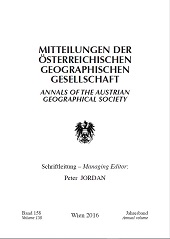
Mitteilungen der Österreichischen Geographischen Gesellschaft Band 158/2016, pp. 37-58, 2019/05/27
158. Jg. (Jahresband), Wien 2016

Parisian hôtels meublés are traditionally short-term accommodation where migrants, first from French provinces, then from abroad – especially Maghreb, and more specifically Algeria – where living in poor conditions. From the ‘golden age’ in the interwar period where they housed around 11% of the Parisian population until current times, the sector has decreased, and become more and more stigmatised. Nevertheless, they can be considered as post-colonial ‘milieu de mémoireʼ of migrations belonging to different generations, contexts and origins. Thanks to a composite approach, ethnographic (observation and interviews) and literary (study of a large corpus of novels related to hotels meublés), the chapter shows that those places are emblematic of specific regimes of memories, both dominated and unconventional, suffering and creative. The first part is dedicated to describing the hotels as ambiguous and complex places, where the subtle hierarchy of spaces makes the co-habitation possible, and can be considered as support for memories. The second part deals more precisely with ‘doing memoryʼ: Both oral histories and literary works are embraced as interpretative constructions reformulating experiences. The last part shows categories and assignments at work in the hotels, where narratives are calling for both a right to the city and a certain acknowledgment of the subalterns beyond disruptions, displacements and silences.
Keywords: Hôtels meublés, migrants, memory, narration, post-colonial, ethnography, literature